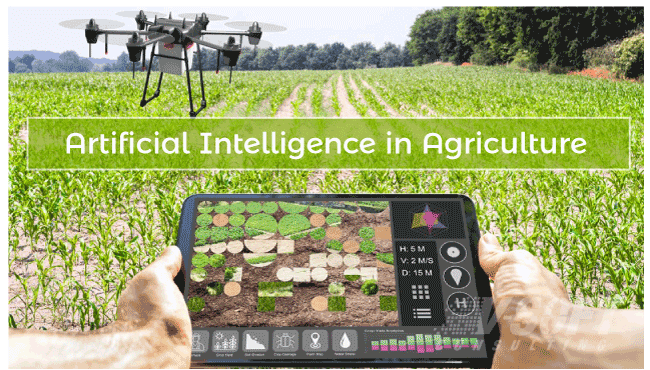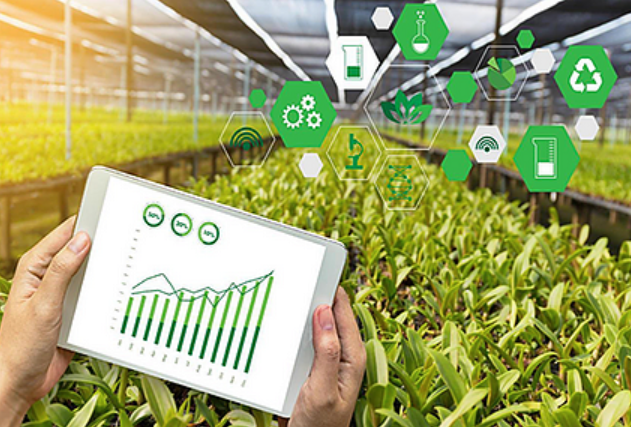Agriculture has been the backbone of human civilization for thousands of years, providing food and raw materials for clothing, shelter, and other necessities of life. However, with the increasing demand for food due to population growth, climate change, and other factors, the traditional methods of farming are no longer sufficient to meet these challenges.

Fortunately, Artificial Intelligence (AI) has emerged as a game-changing technology that can revolutionize agriculture in many ways. In this article, we will explore the benefits of AI in agriculture, how it can be used for precision farming, crop monitoring, soil management, climate-smart agriculture, crop yield optimization, pest and disease control, and livestock farming.
The benefits of AI in agriculture:
AI can provide many benefits for the agriculture sector, such as reducing labor costs, increasing productivity and efficiency, improving yield and quality of crops, and reducing environmental impacts. By using AI, farmers can make better decisions based on accurate data and insights, which can help them optimize their operations and achieve better results. AI can also help farmers to monitor their crops and livestock in real-time, detect problems early, and take corrective actions before they become major issues.
AI and precision farming techniques:
Precision farming techniques involve using technology to collect data about soil conditions, weather patterns, and crop growth to make informed decisions about how to manage crops. AI can help farmers to analyze this data in real-time and make predictions about future crop yields, identify areas of inefficiency, and optimize resources such as water, fertilizer, and pesticides. By using precision farming techniques, farmers can reduce waste, save money, and increase the sustainability of their operations.

Revolutionizing crop monitoring with AI:
Crop monitoring is a critical part of agriculture, as it allows farmers to track the growth and health of their crops and identify potential issues such as pests, diseases, or nutrient deficiencies. AI can help farmers to monitor their crops more accurately and efficiently by using remote sensors, drones, and other technology to collect data about plant health, soil conditions, and weather patterns. By using AI to analyze this data, farmers can detect problems early and take corrective actions before they become major issues, ultimately leading to a higher crop yield.
AI-Enabled soil management strategies:
Soil management is essential for maintaining healthy and productive crops, as soil quality affects the growth, yield, and nutrient content of plants. AI can help farmers to develop better soil management strategies by analyzing data about soil composition, moisture levels, and nutrient content. By using this data, farmers can optimize their use of fertilizers, pesticides, and other inputs to improve soil health and increase crop yield.
AI and climate smart agriculture:
Climate change is a major challenge for agriculture, as it affects weather patterns, soil conditions, and crop growth. Climate-smart agriculture involves using technology and best practices to adapt to these changes and reduce greenhouse gas emissions. AI can help farmers to implement climate-smart agriculture by analyzing data about weather patterns, soil conditions, and crop growth to develop more resilient and sustainable farming practices. By using AI to optimize resource use and reduce waste, farmers can minimize their environmental impact and contribute to a more sustainable future.
AI-Driven crop yield optimization:
Crop yield optimization is a critical goal for farmers, as it directly affects their profitability and ability to feed the world’s growing population. AI can help farmers to optimize crop yield by using data to predict plant growth and development, identify areas of inefficiency, and optimize resource use. By using AI to monitor crop health and identify potential issues, farmers can take corrective actions that can ultimately lead to higher crop yields.
AI-Enhanced pest and disease control:
Pest and disease control is essential for maintaining healthy crops and preventing economic losses. AI can help farmers to detect and control pests and diseases more effectively by using data from remote sensors, drones, and other technology to monitor plant health in real-time. By using AI to analyze this data, farmers can identify potential problems early and take corrective actions before they become major issues.
AI in livestock management and farming:
Livestock management and farming require precise monitoring and care to ensure the health and well-being of animals. AI can help farmers to monitor their livestock more effectively by using sensors and other technology to track animal health, behavior, and other factors. By using AI to analyze this data, farmers can detect potential issues early and take corrective actions to prevent disease outbreaks, increase productivity, and improve animal welfare.
Case Studies:
- Blue River Technology, a company owned by John Deere, has created a new system called See & Spray, which uses AI to identify individual plants and apply herbicides to only the plants that need it. This reduces the amount of herbicide used and minimizes environmental impact while also improving crop yield by removing competition from weeds.
- The Yield, a technology company in Australia, has developed a platform that uses AI to monitor water quality for oyster farmers. By collecting data from sensors in the water, the system can predict disease outbreaks and provide farmers with early warnings, allowing them to take action to prevent the spread of disease and optimize harvest times. This approach improves sustainability and reduces losses for farmers.
The future of agriculture with AI:
AI is rapidly changing the agriculture sector, providing farmers with new tools and insights to optimize their operations and increase sustainability. However, there is still much work to be done to fully realize the potential of AI in agriculture. The future of agriculture with AI is likely to involve the integration of multiple technologies, such as machine learning, robotics, and blockchain, to create a more connected and efficient food system. As AI continues to evolve, farmers will be able to make more informed decisions, reduce waste, and increase productivity, ultimately helping to feed the world’s growing population.
Lastly, AI has the potential to revolutionize agriculture in many ways, from precision farming to pest and disease control, and livestock management. By using AI to analyze data and optimize resources, farmers can increase productivity, reduce waste, and improve sustainability. As AI continues to evolve, it is likely to play an increasingly important role in the future of agriculture, helping farmers to meet the growing demand for food while minimizing their environmental impact.
Frequently asked questions
What is precision farming?
How can AI help reduce the environmental impact of agriculture?
How can AI help predict crop diseases?
What are some challenges to implementing AI in agriculture?
How can AI help with precision farming?
Can AI help improve livestock management?
What are the benefits of using AI in agriculture?
How can farmers and policymakers promote the use of AI in agriculture?
Question not answered above? Contact us
